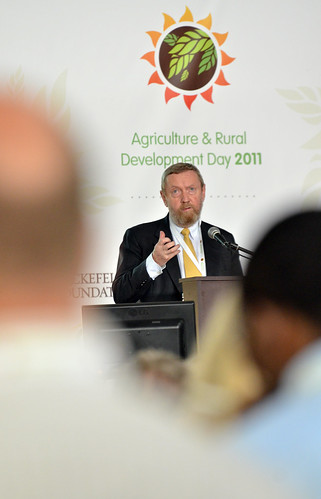What is the importance of Sustainable Agriculture?

Image by CGIAR Climate
In the picture: Prof. Sir John Beddington, Chair of the Commission on Sustainable Agriculture and Climate Change. Photo: N. Palmer (CIAT). Please credit appropriately.
In connection to the UNFCC COP 17 conference in Durban, South Africa in December 2011, CCAFS and several other partners organized an Agriculture and Rural Development Day (ARDD). It was a major one-day event that brought together several hundred policy makers, farmers, scientists and development experts to discuss the urgent need for rural people in developing countries to play a greater role and receive stronger support in climate change adaptation and mitigation.
Read more about CCAFS on our webpage
To learn more about Agriculture and Rural Development Day (ARDD), go to the event webpage
Read related blog stories on CCAFS blog
Question by Aleigh.: What is the importance of Sustainable Agriculture?
Give your answer to this question below!

It is everything, no point in doing anything that is unsustainable because in the end everything falls apart.In the past lots of farming practices have turned out to be unsustainable that’s why we now have Dust Bowls where the soil blows away and Salinity where the soils are ruined by salty ground water rising to the surface.
D
April 28, 2012 at 1:42 am
when we do organic agriculture .we wont get different kind of Cancer.and Plant diseases cant spread Easily.and too many other things…
alam kooh
April 28, 2012 at 2:17 am
Vital!
The world population is due to double within the next 50 years or so. Without sustainable agriculture we won’t get fed and watered. We need to produce more, from less resources – that’s land, fuel, fertilizer, water etc. Yields haven’t significantly increased within the last 10 years, and with limited amounts of money being invested in R&D, I don’t see significant changes with the world’s output.
So if we don’t improve our sustainability, I wouldn’t want to be here in 50 years time!
MJ
April 28, 2012 at 3:16 am
The definition of sustainable is ‘capable of being continued with minimal long-term effect on the environment’. When you are considering the importance of sustainable agriculture, first you consider impact on the soil, then on the people. We all need food, and the growing, delivery, and purchase of that food must remain affordable so all of us have access. The food needs to be good for our bodies and not lacking in nutrition.
-When it comes to the people and how they consume, if you don’t grow it, you mine it. Everything in your existence is dependent on either agriculture or mining.
-Then, you think about the best management practices that will make growing and extraction efficient enough to provide for the population.
-So, a combination of practices (tools in the toolbox) is necessary for sustainability: preventive practices includes an educated grower who understands stewardship of the land and can determine the proper plants to be used as crops; cultural practices means improving plant growth by choosing the right plant to grow in the right environment; proper mechanical practices insure the land will retain it’s ability to grow crops and not suffer from erosion or nutrient depletion; biological practices means using living organisms to maintain soil health through the practice of replenishment with organic matter (no-till, manure-spreading and composting), plus using biological controls for pests; chemical control of plant growth through the use of fertilizers (composted manures and lab-based products) will allow for maximum amount of food per acre and chemical control of pests (diseases and insects) will remain, but be minimal if all other practices are followed.
-There is no getting around the complexity of sustainable agriculture, but it’s happening all around us and it’s getting better every day.
Nina
April 28, 2012 at 3:51 am